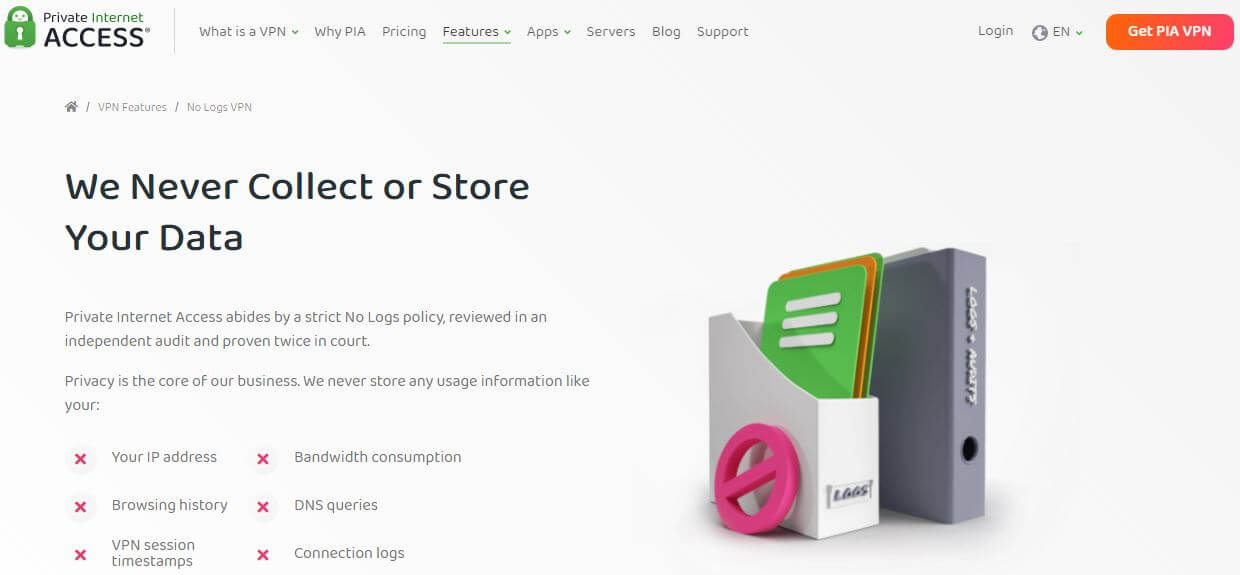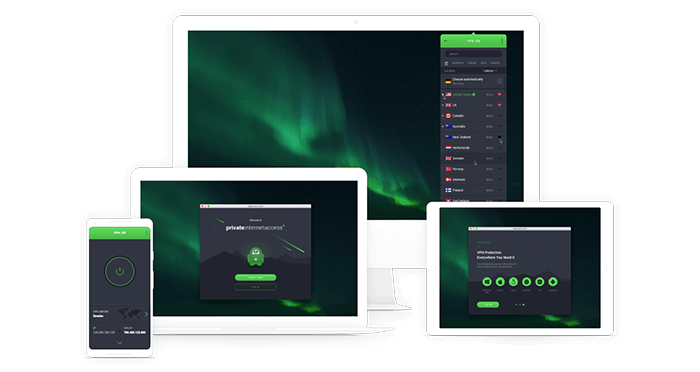Private Internet Access has been around for quite a while now. The privacy-focused provider is packed with features and is an excellent option if you’re looking for a VPN to keep you near-anonymous online. We don’t quite recommend it for streaming, but how good is PIA for torrenting?
That’s an essential question if you frequently torrent and are considering the VPN. After all, the activity has earned its notorious reputation for good reason — it’s packed full of risk.
This article is a complete Private Internet Access torrenting guide. We’ll explore how well the privacy service handles P2P sharing and its relevant functionalities. There’s also a useful step-by-step tutorial for getting started.
But first, why does a VPN come into the picture anyway?

Why You Need a VPN for Torrenting
Every torrent website offers a treasure haul of content, from music to movies, software, books, games, and educational resources.
What’s more, you can get these digital goodies for free. However, before you go rushing in, you should consider the potential issues that could come from doing so without a VPN.
Security Threats
Your connection is vulnerable to cyber threats when you torrent unprotected because it involves a peer-to-peer system where your IP address is exposed.
Hackers may try to intercept the communication between your computer and the torrent server to steal your data, inject malware, or redirect you to fake websites. Distributed Denial of Service (DDoS) attacks are also a real concern, with malicious actors targeting your exposed address.
Quality VPNs like PIA help prevent these threats by masking your IP address, making it significantly harder for cybercriminals to target you.
ISP Throttling
Ever had your internet connection speed suddenly take a nosedive while you were downloading a large file?
Your Internet Service Provider (ISP) may intentionally slow down your speed or bandwidth when it detects high-bandwidth activities like torrenting or streaming.
While it can be frustrating, a VPN means you don’t have to endure it. When you connect to a VPN server, the technology encrypts your data, and ISPs can’t inspect it to identify yours as P2P traffic. As a result, they are unable to selectively throttle your connection.
Legal Consequences
Most countries frown on torrenting but haven’t entirely banned it.
That said, it exists on the gray side of the law, as most commonly downloaded files on torrent sites are copyright-protected. A misstep could result in a long, painful legal tussle where you have to pay fines or even lose your freedom.
While VPN services don’t condone piracy, they help protect against the repercussions if you download a copyrighted file by mistake.
Does PIA Allow Torrenting?
Yes, Private Internet Access allows P2P file sharing. While the provider isn’t exactly vocal about its support due to the reputation torrenting has earned, you can download and seed files on all its servers.
What’s more, it comes with an array of torrenting-friendly features like port forwarding and SOCKS5 proxy.
Is PIA Safe for Torrenting?
Yes, Private Internet Access is safe for torrenting. The VPN has many standard, advanced, and extra features to shield your identity and personal information from threats while you torrent.
Many VPNs allow you to carry out P2P activities on their servers. However, considering how vulnerable some of them are, whether or not you should take that offer is a different matter altogether.
Despite its controversial jurisdiction, PIA is a privacy-focused VPN service. It comes with a deep toolkit of features to keep the nasties and your ISP handoff.
Let’s take a look at the factors that make Private Internet Access a safe option for torrenting.
Zero Logs Policy
Since sharing copyrighted materials in the United States is illegal, PIA’s Colorado headquarters is bound to raise a few eyebrows.
What’s more, the country is a key member of the Five Eyes, an intelligence-sharing coalition.
That said, even if authorities demand user data from the VPN, it has none to hand over.
As a strict no-logs VPN, PIA doesn’t store personally identifiable information on its servers. This stance has been tested multiple times — through an independent audit and in court, no less.

Military-Grade Encryption
PIA encrypts the internet traffic from your device, rendering your personal data unreadable to third parties like hackers and your ISP.
The highly configurable VPN offers two levels of encryption ciphers: AES 128-bit and AES 256-bit. While the former offers better performance, the latter is twice as secure.
In fact, it would take a supercomputer millions of years to break through, rendering it virtually uncrackable.
Kill Switch
No matter how reliable a VPN service is, the connection can drop unexpectedly while you’re torrenting. When that happens, your internet traffic is no longer encrypted and connects directly to a web server, exposing it to prying eyes. That is, if the VPN has no kill switch.
Luckily, PIA’s kill switch automatically disconnects you from the internet when that drop occurs, so your cover isn’t blown.
IP/DNS Leak Protection
Bank-level encryption may keep your data secure, but a leaky VPN provides loopholes to expose it.
Private Internet Access apps prevent your IP address and DNS queries from leaking and opening your device and information to various risks.
What Else Makes PIA Good for Torrenting?
So, Private Internet Access is safe enough for P2P activities — but that’s not all there is to an excellent torrenting VPN. Let’s consider the other factors that count in its favor.
Unlimited Bandwidth
ISP throttling isn’t the only cause of sudden slowdowns while downloading or seeding. Some VPN services (especially the free versions) may restrict the amount of data transferred, which impacts your speed.
PIA will not limit your bandwidth or cap your data, so you can download as much as you want, regardless of their size.
SOCKS5 Proxy/Shadowsocks
PIA’s SOCKS5 proxy is a handy tool for torrenting. It allows you to change your virtual location without encrypting your torrent traffic.
This results in faster speeds and efficient torrenting, which is especially useful when encryption isn’t a top priority, and you simply want to enhance your downloading experience.
Its Shadowsocks feature allows you to connect to the SOCKS5 proxy using multi-hop, adding encryption to the process.
Port Forwarding
PIA is one of only a handful of VPN services with port forwarding. The feature may dramatically reduce latency and increase upload speeds by allowing other peers in the torrent swarm to connect directly to you.
Port forwarding isn’t the safest feature, as it bypasses NAT firewalls and opens your device to potential risks.
Still, the VPN’s top-of-the-line privacy and security functionality all but guarantees the safety of your identity and personal information.
This feature isn’t available on US-based servers.
Plenty of Servers
With over 30,000 servers across 91 countries, PIA’s network size beats out other competitors. With such a massive collection, you’ll always have plenty of nearby connection options, reducing the chances of server overload and your connection speed taking a hit.
Split Tunneling
PIA lets you decide what apps, sites, and IP addresses operate outside the VPN’s encrypted tunnel. In essence, it gives you control over which traffic goes through the VPN and which doesn’t.
For instance, you could download torrent files on your computer while simultaneously visiting your local banking website, running the latter on your standard internet connection.
What’s Lacking?
As you can see, PIA is an excellent VPN for torrenting. However, it’s not perfect. Here are a couple of areas where the service could be better:
No Dedicated P2P Servers
Some providers offer specialized servers to provide optimal performance and security. PIA doesn’t toe the same line.
You can use any of the VPN’s servers for torrenting, but they won’t all deliver reliable connections.
Less Than Stellar Performance
Despite its vast network, Private Internet Access isn’t exactly the fastest provider on the market.
Connection speeds on nearby servers won’t blow you away but are decent, especially when you use the WireGuard tunneling protocol. However, based on our speed test results, performance can drop significantly on more distant servers.
How to Torrent With PIA
Downloading and seeding torrent files with Private Internet Access involves a simple, straightforward process. Here’s what to do:
1. Choose a Torrent Client
A BitTorrent client grabs parts of your target file from various sources, downloads them, and then puts them together like a jigsaw.
The most popular options include qBitTorrent, Deluge, uTorrent, and Vuze. Each option has pros and cons, so a little research before settling on one wouldn’t hurt.
2. Sign Up for Private Internet Access
PIA offers various subscription plans to suit your needs. Head over to the provider’s official website and select a plan that works for you, pay with your preferred payment method, and complete the registration process.
The provider backs your purchase with a 30-day money-back guarantee, so you can try it out completely risk-free.
Get Private Internet Access Today
3. Download and Configure the VPN
PIA offers apps for the major platforms, including Windows, macOS, Linux, iOS, and Android. Download the appropriate version for your device from the website or official mobile app store. The provider has helpful step-by-step resources should you need instructions.
Once installed, launch the VPN app and input your credentials. Next, you want to tweak the settings to make it safe for torrenting:
- Select AES-256 (GCM) from the Data Encryption dropdown menu in the Protocols section. If you’re using OpenVPN ahead of WireGuard, select UDP in the Transport dropdown.
- Enable the kill switch feature in the Privacy section.
4. Connect to a VPN Server
Clicking the large Connect button on the PIA app home screen automatically connects you to an optimal location. Alternatively, you may select from one of the Quick Connect options below the button or expand the server menu to choose from its massive collection across 91 countries.
Once that’s down, confirm that the VPN has spoofed your location using an online IP checker tool.
5. Torrent Safely With PIA
As soon as you confirm the VPN’s new virtual location, you’re all set to download and upload files on torrent sites safely. Just make sure the VPN stays connected every time you engage in the activity.
Torrent on PIA With Multiple Devices

Private Internet Access is compatible with a wide variety of platforms and devices, including Windows, macOS, iOS, Android, Linux, routers, gaming consoles, and more.
While most of its competitors place a cap on the number of devices a single subscription covers simultaneously, PIA has no such limit.
This means that you (and your household) can torrent on as many devices as you want without having to buy another subscription plan.
Can You Torrent With a Free VPN Instead?
It’s not impossible, but torrenting with a free VPN isn’t ideal, and we don’t recommend it. That’s because it comes with several drawbacks that can significantly hamper your torrenting experience.
These limitations include small server networks, bandwidth restrictions, and low data caps. Each of these potentially leads to slow and unreliable downloads.
But it gets worse. Many free VPNs compromise privacy and security. These providers may log your data extensively or lack robust encryption, exposing you to potential risks like hackers, data leaks, and copyright trolls.
On the other hand, PIA offers excellent value for money, with its wallet-friendly pricing and wide range of privacy features. We recommend that you opt for this option instead.
Conclusion
Sure, it offers a vast reservoir of content, but torrenting isn’t quite the safest internet activity. With the real threat of hackers and other cybercriminals, malware from malicious links, ISP monitoring, and potential legal issues, you need quality VPN protection.
Private Internet Access happens to be one of the best options, thanks to its arsenal of high-level security and privacy tools and an array of torrent-friendly features. Subscribe to the service, and you can request a refund within 30 days if you’re unsatisfied.
Try Private Internet Access Now
FAQs
Is PIA a good choice for torrenting?
Yes. We recommend PIA for torrenting due to its robust privacy features, strict no-log policy, and advanced security measures.
On top of that, it offers port forwarding and SOCKS5 proxy, both handy features for the activity.
Can I get into legal trouble while torrenting with PIA?
Torrenting itself is not illegal in most countries, but downloading copyrighted material without permission can lead to trouble. PIA’s encryption and privacy features help protect you from potential legal issues.